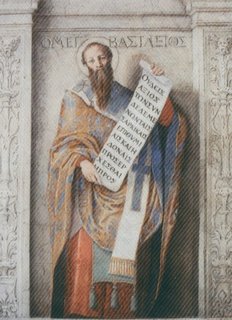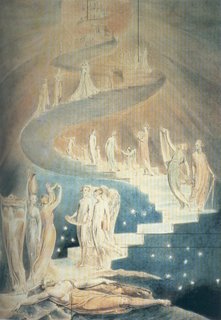 Charity builds up on faith. And so the truth of this doctrine has once again been clearly shown by our beloved Holy Father, Pope Benedict XVI, in his recent trip to Poland.
Charity builds up on faith. And so the truth of this doctrine has once again been clearly shown by our beloved Holy Father, Pope Benedict XVI, in his recent trip to Poland.The faith of the Polish people was evident in their decorum during the Papal Mass. But to share such faith with others, it has to be stronger, meaning, it should be filled with Charity, so His Hoiliness encouraged them. It is only when faith is adorned with Charity that others can see Christ....and eventually follow Christ. St. Paul wrote: "Follow me because I follow Christ." They were following, not St. Paul, but Christ who they see in Paul who was filled with Charity.
Faith may be strengthened in two ways. One is when God grants the soul graces in the form of dilectations leading to the prayer of quiet. This is like putting a carrot stick in front of a donkey so as to make it move. Dilectations attract the soul to go forward. The other way is like giving a soul a little push from behind through personal studies of the writings of the Saints or the Catechism of the Church.
Let us leave it up to God, through His mercy, if He wills to give us those dilectations. Rather, let us concentrate on what we can do: study.
It is said that God ordinarily attracts the soul through the growth of faith by dilectations. But if God sees that the soul has to grow more in humility He obliges the soul to learn, not directly from Him but to learn through other men who had gone through the same route, like St. Basil, Leo the Great, Dionysius the Areopagite and St. Thomas of Aquinas.....through studies.
Though St. Thomas learned from the Benedictines of Monte Cassino the way of increasing one's faith through humility and prayer, he learned later on that studies (like apologetics, exegesis, speculative theology) can help attain faith, like a push from behind. He learned this as a Dominican and the Order had made this practice a part of their spirituality. The Benedictines have a regimen of studies but not as intense as St. Thomas envisioned it.
Here in our part of the world, we have tried the push from behind, i.e. using the help of studies by publishing a newsletter on the Catholic Faith taken from the writings of the Fathers of the Church subscribed mainly by the Catholic Diocesan priests. And among others things we have started distributing copies of the Compedium of the Catechism of the Catholic Church by Pope Benedict XVI to all who request. These are all free of charge because God gives His graces free. This way Catholics would have no excuse in being ignorant.
We cannot love God unless we know God. Studies should encourage the faith that instils the infused knowledge of God. These studies must, however, be handled with caution since they can puff up, as St. Paul warns us. Even God's given dilectation can lose its attraction if we put our attention on the dilectation rather than on the God of consolation.
Imagine the Catholic Faith as a big chunk of knowledge over and above the capabilities of human nature. We need faith to go from the natural to the supernatural level. But Catholicism is still a big chunk to swallow. So we must nip on it little by little, taking small bites and chewing it well. This is equivalent to meditation that is the core of theological study. This is also similar to the description of the creation of the world. To adapt to the weakness of our minds God made it little by little, bit by bit, and saw that every little thing He created was good. And those bite- size Catholic truths are surely good to eat.
After we have tasted it little by little, like God's creation, we should put them back together and look at it as a whole, as God did, when at the end (of creation), He looked at it and saw that everything He made was very good. This is contemplation. This is being in the state of Charity.
Yes, the Pope encouraged the Poles to be strong in their faith that they may be able to share their faith with Europe and, hopefully, with the whole world. The only way to make one's faith strong is to reach Charity, to be a contemplative. To share our Catholic Faith with others we must teach the essence of Catholicism which is summarized in love of God and love of neighbor. Isn't this Charity? But only those who have reached Charity can teach Charity. Needless to say they are, also, the best teachers of faith.
To strengthen Faith there are the writings of the Fathers of the Church, like St. Basil; there are the writings of the Doctors of the Church, like St. Francis de Sales. All the Saints wrote on Faith and Charity. We have no excuse in not knowing our Faith; worse, in not reaching Charity.
We must have Faith. But others will only notice and follow the object of our faith, Jesus Christ, if we, also, have Charity.(Statue of St. Basil by Domenichino, 1608, Grottaferrata Abbey.)



